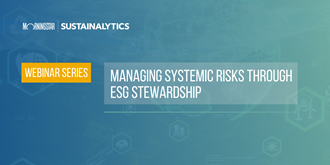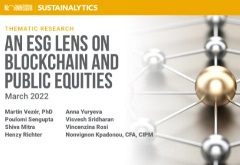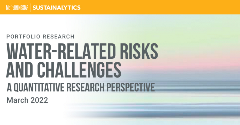Mass Timber in Construction - Big Buildings, Smaller Carbon Footprint
As an innovation in the industry, mass timber construction emits significantly less carbon than traditional concrete and metal structures, while modular construction ensures usability across many building types. This article reviews some of the concerns over structural strength, fire safety, regulatory compatibility, cost savings and the sustainability of increased forestry. It then examines current mass timber buildings and projects and looks at their viability as an alternative material for the future.
ESG Implications of Russia’s Invasion of Ukraine on the Chemicals Industry
The Russian invasion of Ukraine not only threatens global security, but it also raises some important ESG implications for several sectors, including the chemicals industry and particularly the agrochemical subindustry, as Russia exports over 10% of fertilizers globally.
Infographic | Start Your ESG Program: 4 Strategic Steps on the Journey to ESG Performance
In this infographic, we outline essential action-oriented steps to get you started on your ESG journey, including obtaining high-level executive buy-in, resourcing your efforts, strategic planning, and reporting the results of your program.
The EU Action Plan - Insights for Asia Pacific Investors
In 2021, the European Union adopted a strategy to redirect the flow of capital towards the transition to a sustainable economy but what does this mean and how does it impact investors outside of Europe? This webinar will look at the practical implications for investors operating in Asia Pacific.
Looking at ESG in Crypto, Blockchain, and Public Equities
Beyond the volatile crypto market, blockchain has several features that lend well to commercial applications. Blockchain can help improve the transparency, speed and efficiency of data transfers and monetary transactions. Businesses in multiple industries are using blockchain tools to enhance payment platforms and secure supply chain management systems. Sustainalytics’ latest Thematic Research report, An ESG Lens on Blockchain and Public Equities, surveys ESG risks and opportunities related to applications of blockchain technology that are being developed by listed companies across multiple sectors of the economy.
Russia, ESG Risks in Energy, and Corporate Citizenship
As the unprecedented situation in Ukraine continues to unfold, Russia’s energy industry has remained remarkably untouched by the waves of sanctions currently being deployed against the country, despite being arguably its most important sector. While the European Union and its allies have been cautious to avoid disrupting energy flows (unlike how sanctions are currently disrupting the flow of capital), international oil companies are responding to the crisis in their own capacity.
An ESG Lens on Blockchain and Public Equities - Thematic Research Report
The investment risks and opportunities associated with blockchain go beyond the volatile cryptocurrency market, with applications ranging from enhanced payment platforms and contract execution to supply chain management and carbon tracking systems.
What's Happening in Sustainable Finance: ESG Market Continues Rapid Growth, Climate Risks Top WEF List, and More
We’re seeing rapid growth and diversification in the ESG market, with companies increasingly using sustainable bonds, loans, and deposits to finance emissions reductions, renewable energy, waste and water management, transition plans, and more.
Water-Related Risks and Challenges
This report sheds light on the growing effects of water scarcity on companies and countries. To address these challenges, investors can use water reporting metrics to identify companies and countries with severe water risk. We further relate water metrics to firm and country characteristics and highlight substantial cross-sectional differences.
ESG Beginner's Checklist: Action Items on Overcoming Common Obstacles
Discover some of the obstacles ESG leaders face in the early stages of their journey toward sustainability — and what you can about them—in this checklist. Is your company dealing with limited human resources, overwhelming ESG information, inconsistent communication with stakeholders, understanding the competitive landscape, or funding your ESG program?
Key Themes Shaping Proxy Voting in 2022
As the volume and breadth of ESG risk exposure continue to rise, the stage is set for another momentous proxy season. The trending topics of last year will continue to steer the agenda—with the prospect of even more substantial support from shareholders in 2022.
The Sustainability Conundrum of Living Income in Agriculture
Living Income is a crucial consideration among leading companies across some sectors and their supplier companies throughout the agricultural and food supply chain. Companies that manage ESG risk in their supply chains, making targeted investments to improve their resilience, are better positioned to build investor confidence.
Answering the Call for Progress: How Companies Can Respond to Investor Demands on DEI
In this blog post we share what companies can do to communicate their progress on diversity, equity, and inclusion (DEI) to investors and other key stakeholders, particularly with respect to gender diversity and advancing women’s socio-economic status.






-(1200-x-600-px)-(1).tmb-thumbnl_rc.png?Culture=en&sfvrsn=d69966b3_4)










